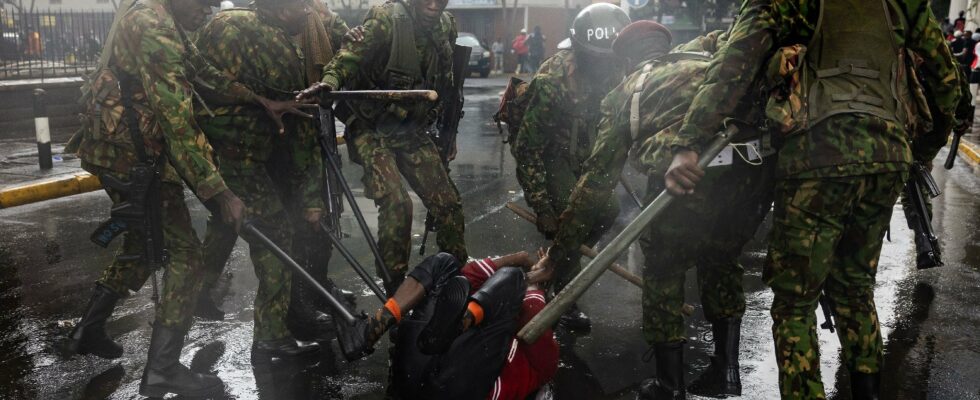“Despite assurances from the Kenyan government that the right to assembly would be respected, human rights observers report the increasing use of live ammunition by the national police in the capital Nairobi,” the director told AFP on Tuesday June 25. Executive of Amnesty International in Kenya, Irungu Houghton. In Nairobi, demonstrators have been opposing a government plan for new taxes for several weeks. On Tuesday, thousands of people gathered as part of this unprecedented anti-government movement led by youth.
“It is now urgent that doctors have safe passage to treat the many injured,” added Irungu Houghton. Amnesty International Kenya reports “many injured”.
Parliament invaded
Several hundred people also forced police barriers and crossed the gates of Parliament, where the tax project is currently being debated, located in the business district of the Kenyan capital, according to images from Kenyan television.
Other demonstrations were held peacefully, without any police opposition, in several other cities in the country, notably in the opposition strongholds of Mombasa (east) and Kisumu (west), in Eldoret (west), a large city in the valley. Rift, President William Ruto’s home region, Nyeri (southwest) and Nakuru (central), according to local media.
In Nairobi, the demonstrators – mainly young people who came with Kenyan flags, whistles or vuvuzelas and chanting “We are peaceful” – encountered a large police force deployed in the business center, notably blocking access to Parliament where began the vote on the 2024-25 draft budget which triggered the protest.
Tensions rose throughout the morning, with police using tear gas and then rubber bullets. Clashes broke out around midday after demonstrators advanced into an area housing official buildings (Supreme Court, Nairobi town hall, etc.). Some demonstrators threw stones in the direction of the police forces, in a tense confrontation a few hundred meters from Parliament.
A movement launched by “Gen Z”
Largely peaceful, the movement called “Occupy Parliament” was launched on social networks shortly after the presentation to Parliament on June 13 of the 2024-2025 draft budget providing for the introduction of new taxes, including one 16% VAT on bread and an annual tax of 2.5% on private vehicles.
The government announced on June 18 that it was withdrawing most of the measures, but the demonstrators continued their movement, demanding the complete withdrawal of the text. They denounce a sleight of hand by the government which plans to compensate for the withdrawal of certain tax measures by others, in particular a 50% increase in fuel taxes.
Initially led by “Generation Z” (young people born after 1997), the movement has transformed into a broader challenge to President Ruto’s policies. The head of state said he was ready to dialogue with young people on Sunday.
Two dead and injured
This mobilization was marked by the death of two people in Nairobi. Several dozen others were injured by police, who also made hundreds of arrests.
“Despite mass arrests and injuries, the demonstrations continued to grow, highlighting the widespread discontent of the population,” Amnesty International Kenya said in a statement on Monday, warning of a risk of “escalation ( which) could lead to more deaths.
Amnesty and the NGO Kenya Human Rights Commission have accused the authorities of carrying out kidnappings of activists. Police spokesperson Resila Onyango did not respond to requests from AFP about these accusations.
The country is heavily in debt
The draft budget must be voted on in Parliament before June 30. For the government, these taxes are necessary to restore room for maneuver to the country, which is heavily in debt.
Kenya, an East African country of around 52 million inhabitants, is an economic powerhouse in the region. But the country recorded inflation of 5.1% year-on-year in May, with food and fuel prices rising by 6.2% and 7.8% respectively, according to the Central Bank.
